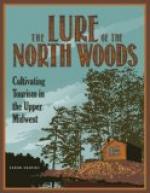After a stunning crash, the thunder began to roll away, the lightning glimmered fitfully farther off, and a torrent of rain broke upon the canoes. Agatha was wet before she could put on her slicker, and when she sat, huddled together, with head bent to shield her face from the deluge, she could not see fifty yards in front. The water was pitted by the rain, which rebounded from its surface with angry splashes. It ran down the half-breeds’ faces and soaked their gray shirts, but they did not stop paddling to put on their coats. Agatha wondered with some uneasiness what they thought was going to happen.
The rain got lighter suddenly and a cold draught touched her forehead. She saw Thirlwell glance astern, although he did not miss a stroke. His soaked hat drooped about his head and his thin overalls were dripping; she thought he saw she was looking at him, but he did not speak. Then the haze that had shut them in rolled back and a dark line advanced across the lake. It had a white edge and there was a curious humming, rippling noise that got louder. Thirlwell signed to one of the Metis, who stepped a mast in the hole through a beam and loosed a small sail. The sail blew out like a flag, snapping violently, and the man struggled hard to push up the pole that extended its peak. Then he hauled the sheet, and the canoe swayed down until her curving gunwale was in the water. The half-breed moved to the other side and Thirlwell beckoned Agatha.
“Come aft by me!”
She obeyed, although it was difficult to crawl over the cargo in the bottom of the sharply slanted craft. The humming noise had changed to a shriek, but it did not drown the turmoil of the water. Short waves with black furrows between them rolled up astern and although they were not high they looked angry. Agatha saw that Thirlwell wanted to trim the canoe. He held a long paddle with the handle jambed against the pointed stern, and the canoe’s side rose out of the water as she paid off before the wind.
“We could do nothing with the paddles,” he said. “A sail’s no use in a river-canoe, but these heavy freighters run pretty well. Luckily it’s a fair wind to the river mouth.”
Agatha could scarcely hear him, but when she asked how far it was he nodded as if he understood.
“Three or four miles! Not much sweep for the wind, but it will raise a nasty sea before we get there.”
Gazing at the driving clouds that blotted out the forest, she tried to ask if he could find the river, but just then the canoe rolled and the little spritsail swelled like a balloon. There was a hiss and a splash, and the top of a wave that split at the stern and rolled forward poured in at the waist. Thirlwell bent over the paddle and slackened the sheet, the canoe swung her bows out, and leaped ahead. Spray blew about in showers; the foam stood in a ridge amidships and boiled high about the stern. It seemed to Agatha that they were traveling like a toboggan, and she had an exhilarating sense of speed that banished the thought of danger.




